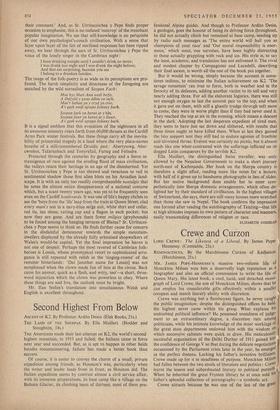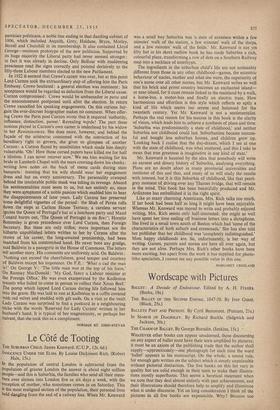Crewe and Cuizon
LORD CREWE: The Likeness of a Liberal. By James Pope' ti Hennessy. (Constable, 21S.) REMINISCENCES. By the Marchioness Curzon of Kedleston, (Hutchinson, 21s.) MR. JAMES POPE-HENNESSY'S massive two-volume life of Monckton Milnes won him a deservedly high reputation as a biographer and also an official commission to write-the life of Queen Mary. His latest book, a cool, lucid, and detached mono- graph of Lord Crewe, the son of' Monckton Milnes, shows that he can employ his considerable gifts effectively within a smaller compass and match literary ability with discretion. Crewe was anything but 'a flamboyant figure, he never caught the public imagination; despite the distinguished offices he held, the highest never came within his grasp. What explains his undoubted political influence? He possessed soundness of judge' ment to an extraordinary degree, a discretion rare among, politicians, while his intimate knowledge of the inner workings 01 the great state departments endowed him with the wisdom on which successive cabinets were quick to draw. His meticulously successful organisation Of the Delhi Durbar of 1911 gained his' the confidence of George V so that during the delicate negotiations occasioned by the Parliament crisis later in the year, he emerged as the perfect duenna. Lacking his father's inventive brilliance. Crewe made up for it in steadiness of purpose. Monckton had fallen between the two stools of literature and politics: Crewe learnt the lesson and subordinated literary to political pursuits' / When he inherited the great Fryston library he at once sold his father's splendid collection of pornography—a symbolic act. Crewe attracts because he was one of the last of the great
patrician politicans, a noble line ending in that dazzling cabinet of 1906, which included Asquith, Grey, Haldane, Bryce, Morley, Birrell and Churchill in its membership. It also contained Lloyd George—ominous prototype of the new politician. Supported by its huge majority the Liberal party had never seemed stronger : in fact it was already in decline. Only Balfour with maddening prescience read the signs correctly and pointed derisively to the fifty-three Labour members elected to the new Parliament.
In 1922 it seemed that Crewe's career was over, but at this point Lord Curzon took the extraordinary step of offering him the Paris Embassy. Crewe hesitated : a general election was imminent : his acceptance would be regarded as defection from the Liberal cause. Curzon compromised : Crewe would be ambassador in petto and the announcement postponed until after the election. In return Crewe cancelled his speaking engagements. On this curious bar- gain the ever-discreet biographer makes no comment. When offer- ing Crewe the Paris post Curzon wrote that it required 'authority, influence, distinction, power.' Revealing words! The part these notions played in Curzon's own career is underlined by his widow in her Reminiscences. She does more, however, and behind the facade of the aristocrat consumed with the conviction of his hereditary right to govern, she gives us glimpses of another Curzon : a Curzon flayed by sensibilities which made him deeply vulnerable. 'Oh! How those cursed papers have killed me for half a lifetime. I can never recover now.' We see him waiting for his bride in Lambeth Chapel with the tears coursing down his cheeks : writing love notes on the back of menu cards during state banquets : insisting that his wife should wear her engagement dress and hat on every anniversary. The personality cramped behind the intolerable public mask was taking its revenge. Absurd his sentimentalities must seem to us, but not entirely so, since they were symptoms of a noble passion which enabled him to bear the disappointments of later years. Lady Curzon has preserved some delightful vignettes of the period : the Shah of Persia rolls down the steps at Carlton House Terrace; a careless servant ignites the Queen of Portugal's hat at a luncheon party and Maud Cunard bursts out, 'The Queen of Portugal is on fire!'; Horatio Bottomley is given precedence over Lord Curzon, then Foreign Secretary. But these are only trifles; more important are the hitherto unpublished letters written to her by Curzon after the crown of his career, the long-awaited premiership, had been snatched from his outstretched hand. He never bore any grudge, said Baldwin in a panegyric in the House of Commons. The letters tell another story. His comments are uniformly acid. On Baldwin : 'Nothing can exceed the cheerfulness, good temper and courtesy of Baldwin except his impotence. On F.E. : 'What a cad the man is!' On George V : 'The little man was at the top of his form.' On Ramsay MacDonald : 'My God, fancy a Labour minister at the Foreign Office.' He was even exasperated by the Kedleston tenants who failed to come in person to collect their Xmas Beef.' The pomp which lapped Lord Curzon during life followed him into the grave. He was laid to rest at Kedleston in a coffin covered with red velvet and studded with gilt nails. On a visit to the vault Lady Curzon was surprised to find a postcard in a neighbouring niche with the words 'Reserved for Lady Curzon' written in her husband's hand. It is typical of her magnanimity, or perhaps her naivete, that she took this as a compliment.
NORMAN ST. JOHN-STEVAS



































 Previous page
Previous page